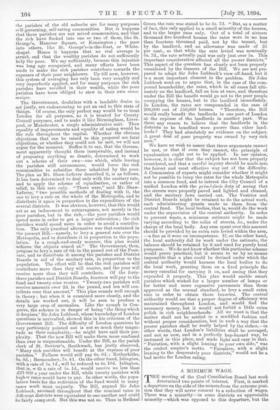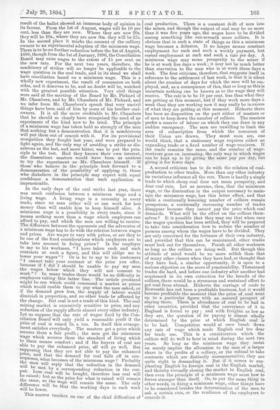A MINIMUM WAGE, T HE meeting of the Coal Conciliation Board
last week determined two points of interest. First, it marked a departure on the side of the miners from the extreme posi- tion that they will never consent to a reduction of wages. There was a. minority—in some districts an appreciable minority—which was opposed to this departure, but the result of the ballot showed an immense body of opinion in its favour. From the 1st of August, wages will be 10 per cent. less than they are now. Where they are now 20s. they will be 18s., where they are now 30s. they will be 27s. In the second place it marks the consent of the colliery owners to an experimental adoption of the minimum wage. There is to be no further reduction before the 1st of August, 1896, though from the 1st of January, 1896, the Conciliation Board may raise wages to the extent of 15 per cent. on the new rate. For the next two years, therefore, the machinery of strikes will no longer be applicable to the wage question in the coal trade, and in its stead we shall have conciliation based on a minimum wage. This is a wholly new experiment, the result of concession on both sides, and it deserves to be, and no doubt will be, watched with the greatest possible attention. Very civil things were said at the meeting of the Board by Mr. Pickard of Mr. Chambers, and by Mr. Chambers of Mr. Pickard, and we infer from Mr. Chambers's speech that very uncivil things have been said of him by some of his brother coal- owners. It is all the more creditable to Mr. Chambers that he should so clearly have recognised the need of an experiment of the kind now to be tried. The principle of a minimum wage has taken hold so strongly of the men that nothing but a demonstration that it is mischievous will put them out of conceit with it. For its provisional recognition they fought last year, and were prepared to fight again, and the only way of avoiding a strike as dis- astrous as the last, and more bitter, was to put the prin- ciple to the test. Had they known their own interest, the dissentient masters would have been as anxious to try the experiment as Mr. Chambers himself. If those who believe in the principle look forward to a demonstration of the possibility of applying it, those who disbelieve in the principle may expect with equal confidence a demonstration that such application is impracticable.
In the early days of the coal strike last year, there was much confusion between a minimum wage and a living wage. A living wage is a necessity in every trade, since no man either will or can work for less money than will enable him to keep himself alive. A minimum wage is a possibility in every trade, since it means nothing more than a wage which employers can afford to pay, and which the men are willing to receive. The difference between the opponents and the advocates of a minimum wage hap to do with the relation between wages and prices. Are wages to vary with prices, or are they to be one of the fixed considerations which employers are to take into account in fixing prices ? Is the employer to say to his workmen, "I have taken such and such contracts at such a figure, and this will oblige me to lower your wages"? Or is he to say to his customers "I cannot take your contract at the price you offer, because if I did I should be unable to pay my men the wages below which they will not consent to work " ? In many trades there would be no difficulty in employers taking this latter line. The article produced might be one which could command a market at prices which would enable them to pay what the men asked, or if the demand grew less, the supply of labour would diminish in proportion, and no other trade be affected by the change. But coal is not a trade of this kind. The coal mining market is excessively sensitive to price, and any reduction of the supply affects almost every other industry. Let us suppose that the rate of wages fixed by the Con- ciliation Board will only yield a reasonable profit if the price of coal is raised 2s. a ton. In itself this arrange- ment satisfies everybody. The masters get a price which secures them a fair profit ; the men get the minimum wage which secures them the standard of living which to them means comfort ; and if the buyers of coal are able to pay the enhanced price, all will go well. But supposing that they are not able to pay the enhanced price, and that the demand for coal falls off in con- sequence, what becomes of the minimum wage ? Probably the in will reply that the reduction in the demand will be met by a corresponding reduction in the out- put. Less coal will be bought, therefore less coal will be raised ; but as the price for what is raised will remain the same, so the wage will remain the same. The only difference will be that the working days in each week will be fewer.
This answer touches on one of the chief difficulties of coal production. There is a constant drift of men into the mines, and though the output of coal may be no more than it was five years ago, the wages have to be divided among something like one-seventh more colliers. It is obvious that in such a state of things as this a minimum wage becomes a delusion. It no longer means constant employment for such and such a weekly payment, but casual employment at such and such a rate per day. A minimum wage may mean prosperity to the minor if he is at work five days a week ; it may not be much better than starvation to the man who is at work three days a week. The first criticism, therefore, that suggests itself in reference to the settlement of last week, is that it is silent about the number of days for which the men will be em- ployed, and, as a consequence of this, that so long as this is uncertain nothing can be known as to the wage they will receive. The rate is to be 10 per cent. less than what they are getting at this moment, but if they work more days a week than they are working now it may really be in excess of what they are getting at this moment. Hitherto there has been no disposition on the part either of masters or of men to keep down the number of colliers. The masters prefer a reserve of labour on which they can draw in any sudden emergency. The men are unwilling to limit the area of subscription from which the resources of their Union are drawn. They must soon see, one would think, that a stationary wage requires either an expanding trade or a fixed number of wage-receivers. If the trade remains the same, and the number of wage- receivers goes on increasing, the only way in which wages can be kept up is by giving the same pay per day, but giving it for fewer days.
A second criticism has to do with the relation of coal- production to other trades. More than any other industry its variations influence all the rest. There is hardly a single trade to which cheap coal does not mean prosperity, and dear coal ruin. Let us assume, then, that the minimum wage, or the diminution in the output necessary to main- tain the minimum wage, has this latter effect, and that while a continually lessening number of colliers remain prosperous, a continually increasing number of trades disappear because they cannot pay the price which coal demands. What will be the effect on the colliers them- selves ? It is possible that they may say that when once the wages question has been settled, they will be prepared to take into consideration bow to reduce the number of persons among whom the wages have to be divided. They are only concerned for the fortunes of their own industry, and provided that this can be maintained, other trades must look out for themselves. Perish all other workmen so long as the colliers are doing well. But though this attitude of mind would be no more selfish than that of many other classes when they have had, or thought that they have had, a similar opportunity, it is open to a serious objection on the score of practicability. Threatened. trades die hard, and before one industry after another had acquiesced in its own extinction for the benefit of the colliers, there would be a strenuous and sustained effort to get coal from abroad. Hitherto the carriage of coals to Newcastle has not been a profitable business, but it would become profitable the moment that the price of coal went up to a, particular figure with an assured prospect of staying there. There is abundance of coal to be had in other countries, provided that the conveyance of it to England is found. to pay ; and with freights as low as they are, the question of its paying is almost wholly determined by the price at which English coal is to be had. Competition would at once break down any rate of wage which made English coal too dear for trade use. This is a consideration which the colliers will do well to bear in mind. during the next two years. So long as the minimum wage they insist on merely implies the allocation to the men of a larger share in the profits of a colliery, or the refusal to take contracts which are distinctly unremunerative, they are quite right in demanding it. But if it comes to sun- planting English by foreign coal in the English market, and thereby virtually closing the market to English coal, then even the principle of a minimum wage must bow to forces stronger than itself. Or, to put the same thing in other words, in fixing a minimum wage, other things have to be considered besides the determination of the men to ask a certain sum, or the readiness of the employers to concede it.



































 Previous page
Previous page